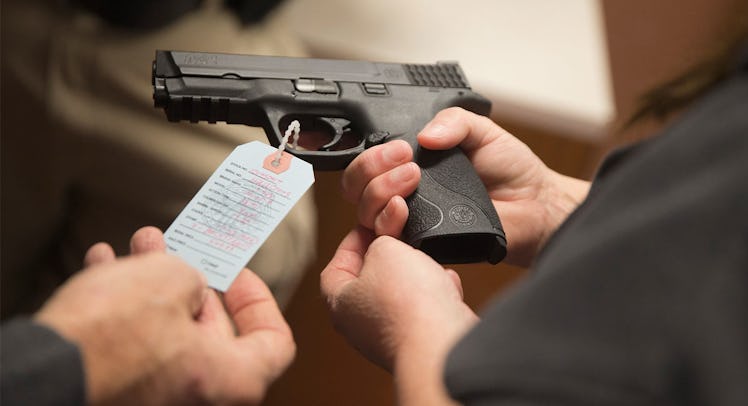5 Years After Sandy Hook, Gun Sales are Falling for the Wrong Reasons
The curious case of gun stocks and sales in the wake of tragedy.

Adam Lanza killed 20 young children and six educators at Sandy Hook Elementary on December 14th, 2012 using two handguns and a Bushmaster Model XM15-E2S. In the days after, there was — as there had been previously following the slaughters at Columbine and Virginia Tech — an outcry from families and politicians (President Obama cried on national television) about the lax state of gun control laws. Afraid those laws might change, gun enthusiasts purchased more weapons, buoying the fortunes of Remington, which owns the Bushmaster brand. Five years later, Remington may be on the verge of bankruptcy. But this is not indicative of lessons being learned through bloodshed, but of perverse incentives: Ironically, confidence that lawmakers will do nothing even in the event of another massacre has put Remington in financial jeopardy. The low sales that will force the company to furlough workers in early 2018 offer proof that little progress has been made to keep guns from those who might use them to hurt children.
Since Sandy Hook, boom and busts of gun sales have followed an all-too-predictable pattern. The cycle goes like this: After a mass killing, lawmakers who regularly voice pro-gun control sentiments tweet or speak about changing gun regulation laws to target a certain loophole that the mass shooter used to get weapons or voice an interest in having tighter restrictions overall. In response, the NRA releases a statement– and these range from politic to vitriolic — saying ownership of semi-automatic weapons is fundamental to American culture and constitutionally guaranteed. NRA supporters and non-NRA supporters who want guns for a range of reasons, most of which are in no way suspect, buy guns because they are afraid that laws will soon pass that will restrict their ability to buy guns. People who invest in gun stocks get richer because of the spike in gun sales.
Companies like Remington don’t intend to profit off murder. But that’s how it has traditionally worked. After the Las Vegas attack in October, which claimed the lives of 58 people and wounded 500, it would have be reasonable to expect gun sales to surge. Didn’t happen. Why not? Seemingly because there was no one believed that the president or a Republican congress would pass any legislation limiting gun sales. So, gun sales did not rise. They continued to fall.
Remington is not the only gun brand that is suffering. As reported by The Intercept, Sturm, Ruger & Company, another massive gun manufacturer in the United States, noticed that their usual profit explosions that they had seen after other mass shootings had not followed for Las Vegas. But unlike Ruger, Remington is not just failing to see profit spikes — they’re suffering massively. The company recently laid off nearly 200 employees and enacted a hiring freeze. In the third quarter of 2017, their gun sales plummeted over 40 percent. They’ve lost over 60 million dollars in 2017 so far.
Without any major calls for changing gun policy from the President or the party in power, and without any actual gun policy moving through the house or senate, potential gun buyers have literally nothing to fear. So they don’t buy. The Atlantic, in covering this strange phenomenon, once referred to former President Obama as “the best gun salesman on earth,” because of his willingness to speak out about gun tragedies. It’s a nice turn of phrase, but the truth is far uglier. The truth is that Obama created a favorable market for gun sales.
The revelation that anti-gun activism may actually spike the sale of guns is problematic, especially for activists like Mark Barden, a father who lost his very young son at the hands of Adam Lanza in the Sandy Hook shooting. His organization, Sandy Hook Promise, fights to make sure that a Sandy Hook can’t happen again. Is his fight making gun sales spike? It’s a concern, which is part of the reason the organization has reoriented to help address emotional issues among students who might commit acts of violence rather than directly addressing the proliferation of firearms.
While people who start organizations to end the scourge of gun violence may be, somehow, related to the spike in gun sales, there’s another relationship between mass tragedies and shootings that is often not explicitly explored. Gun manufacturers have historically profited off of mass tragedies. This is a trend that has made itself clear in through the Obama presidency, as mass shootings became both more frequent and more deadly. In the wake of the recent Las Vegas murders, a partner with the gun accessories company firm Compass Diversified Holdings posited that sales had not spiked because of “the lack of discussion surrounding change in gun laws.” There are plenty of reasons to believe that is correct.
Is it better that gun companies are not, in the Trump era, making money when children die? To answer the question is to dwell on a moral quibble and ignore the more salient fact: Kids are still dying. The end of the post-massacre sales boom represents, in a sense, confidence that this will continue and that meaningful action will not be taken — at least not from the gun control angle.
Gun companies have long argued that they are not culpable for mass shootings. And it is true that they are not triggermen. It is also true that its hard to sympathize with businesses that operate most efficiently under tragic circumstances. Numbers do not lie. Neither do body counts.
This article was originally published on